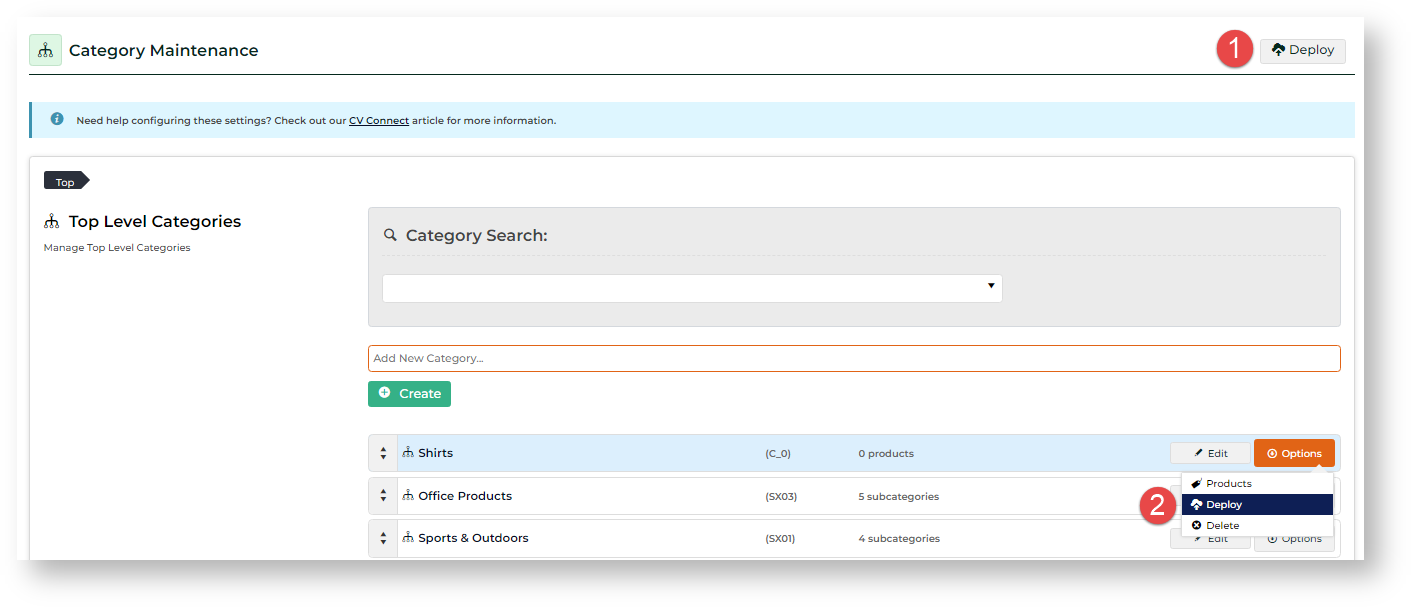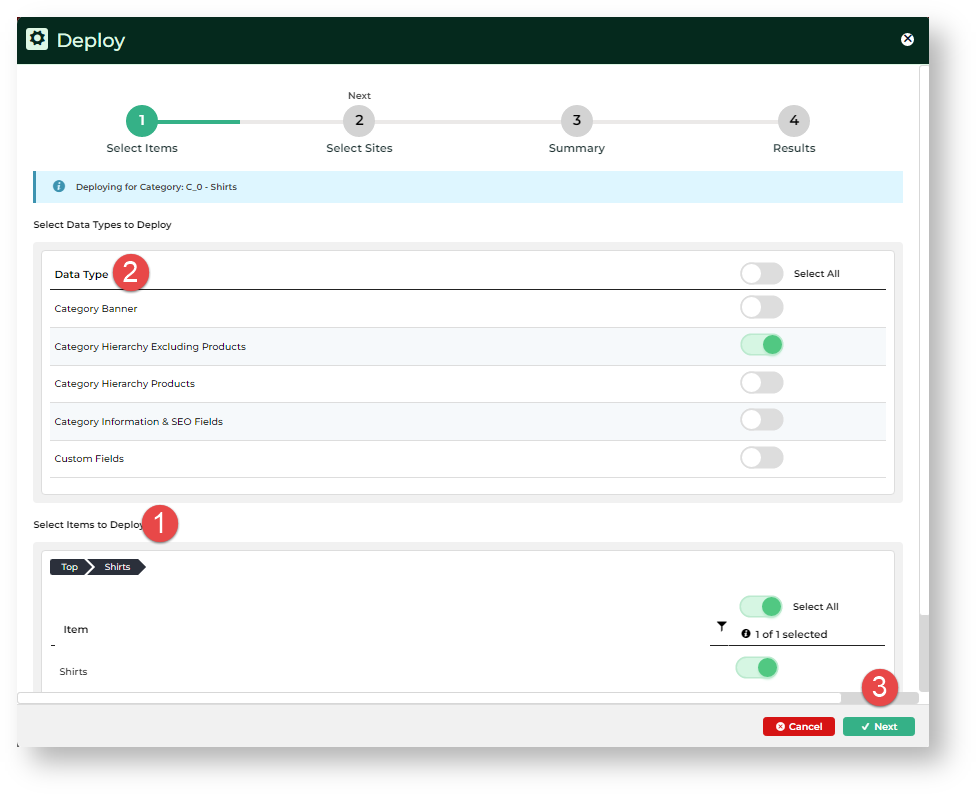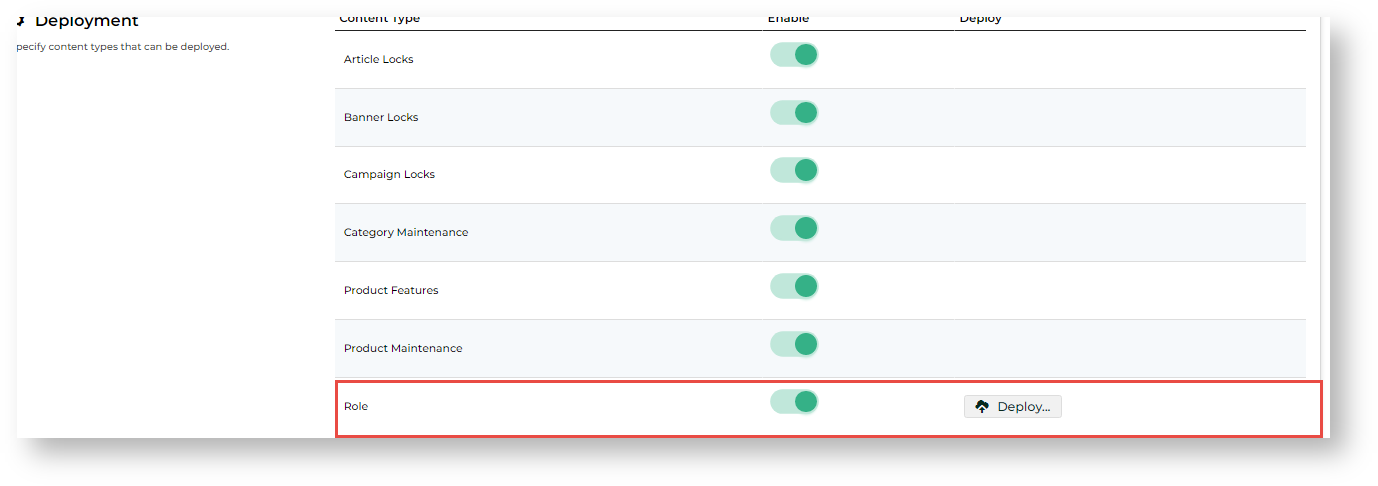Start Deployment
When an item or page of items is of a deployable content type, you will see a Deploy button on the top right of the page or on the
item's Options menu.
The general rule is:
- use the Deploy button to select from all multiple valid items on the page.
- use Deploy on an item's menu
- to
- deploy only that item.
| Info | ||
|---|---|---|
| ||
Deployment function is disabled (no Deploy buttons or menu items) when no target sites have been set for the source site. |
Example: deploying in Category Maintenance
(1) Deploy button, (2) Deploy menu item
(1) Clicking the Deploy button allows
all valid categories can be selected for a deployment
.
(2)
Selecting Deploy from the 'Shirts' category's Options menu
| Panel | ||||
|---|---|---|---|---|
On this page:
|
Deployment Rules
Deployment rules are there to maintain content integrity on target sites.
- Deployment will be cancelled if a content item is not found.
- Deployment will fail if the item is in draft mode (if Page Preview is on).
allows only this category to be selected.
Deployment Steps
Regardless of content type, the deployment process is completed using the Deploy popup. This opens on selecting the Deploy button or the Deploy menu itemsteps are the same. Clicking Deploy opens the Deploy popup. NOTE - The popup will not open if you attempt to deploy an 'unlocked' lockable itemcampaign.
Deployment StepsClick Configure.
In Linked Sites Feature Settings, toggle ON the feature type(s) you want to deploy.
Deploying Role Settings
Role settings changes are deployed from the Deployment section of the Linked Site1- Select the data type. Select Data Item(s)and item(s) to deploy. | Step-by-step | Valid data items are displayed for selection. NOTE - If the popup has no no data items, it means there are no deployable items. 1. Toggle ON each data type you want to deploy.2. Toggle ON each item to deploy. (Not all content types have the item level.)to select data item(s). 2. If applicable, toggle to select data type(s). NOTE - Some content items have selectable data types, e.g., products, categories. This allows you to specify only those data types you want to deploy. 3. Click Next. 2 - Select target site | Step 1 Deploy |
2. Select Target Site(s). | Step-by-step | 1 4. Toggle ON to select one or more destination target site(s) to deploy to. 25. Click Next. | |
3 - Check data items and target site(s) are correct. | Step-by-step | ||
1. Review the data and destination site summary. 2. To proceed with deploytment, click Deploy. | |||
4 - Check deployment results. | Step-by-step |
| Tip |
|---|
You can always view a deployment results in the Content Deployment Log. |
Administrator Functions
Enable/disable Deploy Content
Deploy disabled Deploy enabled
The Content Deployment Log will also be available on the Advanced Content menu. See: View Deployment Log.
Add linked sites
Sites that share an organisation Id are treated as in a network. You may not always want to deploy a set of changes to all available sites. What sites a deployment instance can select from is set in Feature Settings.
To add sites that content can be deployed to:
Go to Settings → Settings → Content → Linked Sites.Click Configure.
Deploying lockable objects
The contents of a lockable object must be in locked status to be deployable. if unlocked, only the unlock status is deployed. This is used to allow users on linked sites to edit content. You'll know when an object is deployable by the displayed Deploy button or link under Options. If your site uses Page Preview and an object is deployed before Publishing, it will be deployed in the Draft mode.
Go to the locked object.Locate the Deploy button and click it.
In the Deploy modal, select individual objects to deploy or toggle Select All.
Click the Next button.
Select one or more available deployment sites.
Click Next.
Check the deployment results. NOTE - The result for each individual site is displayed separately.
You can check the deployment details for more information. On the Results modal, click the link.
Deploying non-lockable objects
Non-lockable objects need additional setting to be enabled for deployment.
To deploy a non-lockable object:
In the CMS, go to Settings → Settings → Content → Linked Sites
| Step 2 Deploy | |||||
3. Check Data Item & Target Site Selections6. In Deployment Name, name this deployment. If left blank, the system adds the content type + date as the name. 7. Review data and target site selections. Go back to Steps 1-2 to reselect, if needed. 8. To start deployment, click Deploy. | Step 3 Deploy | |||||
4. Check Deployment Results9. Check the Successfully Deployed? column,
10. Click the link to view the deployment's results, e.g., for errors and other messages.
| Step 4 Deploy |
Deploying Role Settings
Unlike all other content types, Role settings are deployed from the Deploy Content Feature Settings page.
To deploy Role changessettings:
- In the CMS, go to Settings → Settings → Content → Linked SitesDeploy Content.
- Click Configure.
- In Linked Deploy Sites Feature Settings, toggle ON Enable Role Deployment.
- Click the Deploy button displayed Save.
- In To open the Deploy modal, select one or more Roles to deploy.
Click Next.- Select the linked sites for deployment.
- popup, click the Deploy button next to Role.
Anchor deployment-log deployment-log
Viewing Deployment History & Results
| deployment-log | |
| deployment-log |
To check deployment results:
In the CMS, go to Content → Advanced Content → Content Deployment Log.Use the Search tool to find the deployment instance.
Additional Information
| Multiexcerpt | ||||
|---|---|---|---|---|
| ||||
Minimum Version Requirements
| Multiexcerpt | ||
|---|---|---|
| ||
4.38 |
| Multiexcerpt | ||
|---|---|---|
| ||
Implementation by Commerce Vision |
| Multiexcerpt | ||
|---|---|---|
| ||
No |
| Multiexcerpt | ||
|---|---|---|
| ||
Content |
| Multiexcerpt | ||
|---|---|---|
| ||
Yes |
| Multiexcerpt | ||
|---|---|---|
| ||
Both |
| Multiexcerpt | ||
|---|---|---|
| ||
| n/a |
Related help
view any deployment your site was involved in (as source or target site), view the Content Deployment Log. You can also rename a deployment and add notes about it while in the record.
Related Resources
| Content by Label | ||||||||
|---|---|---|---|---|---|---|---|---|
|
| Content by Label | ||||||||
|---|---|---|---|---|---|---|---|---|
|
































